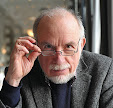Anyone taking notice of the state of our world sees that it is dying. For illustration visit the daily summary of Climate and economy, the Arctic News-Blog or Eliot-Jacobson's Climate Casino – Watching the World Go Bye.
In a similar way the undisputed American hegemony since 1945 seems to go the way of all empires as described by Sir John Glubb Pascha in his short and brilliant essay The Fate of Empires (1976): This way leads from pioneers and conquests to power and safety which then facilitates production and commerce and leads to affluence, luxury, influx of foreigners, dissent, defensiveness, walls, decadence and frivolity. Sir John predicted an US decay already in 1976.
 |
| Sir John Glubb Pascha with soldiers of the Arab legion in Ramallah 1946 |
Its true that the US meanwhile succeeded to squeeze out some ephemeral energy independence by fracking, but this will not last. And China with its long term view and the help of his many autocratic allies builds now a competing empire, gobbling up all the resources it can reach. The involvement of North Korean troops in the Ukraine war would not have happende without the explicit consent of China. In Ukraine we have a war by proxy between the West and the Eastern powers. For Europe without Trump this war will not be sustainable.
To summarise we have a dying US-empire in a dying world.
Elisabeth Kübler-Ross landmark work "On death and dying" described the reactions of patients with fatal disease. I know all these reactions from my work as a physician, their order may be changed or they may be combined, but basically the description holds true:
- The first reaction is often denial.
- If denial does not work anymore it is followed by anger and aggression against fate and against the people wo bring the bad message. As a physician its important not to take this personally.
- Then comes the phase of bargaining, of attempted flight into miraculous solutions, may it be herbal medicine or the consultation of charlatans.
- If unsuccessful this is followed by depression.
- In the best case the process ends in peaceful acceptance.
Comes the phase of bargaining where patients will believe anyone pretending to have solutions, even charlatans: In case this is Donald Trump while California is burning.
From this we can predict, that depression will follow. What form could it take? The world economy is a dead man keeping walking under the weight of a 300 trillion debt by creating even more debt in the optimistic belief that all this will finally work out. Depression will put an end to optimism and this will lead to a global economic crisis. This will be a crisis of belief, which even Trump, the orange Jesus will be unable to solve.

